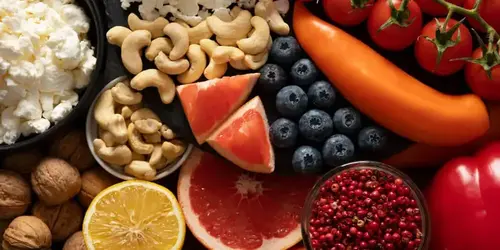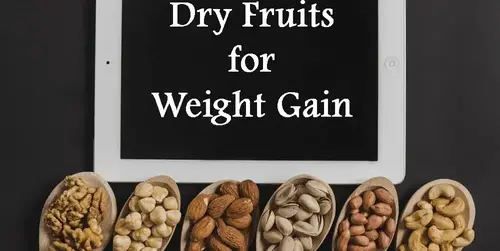
Why Choose Dry Fruits for Weight Gain?
1. Calorie-Dense
The fundamental reason dry fruits support weight gain is their concentrated calorie content. The drying process removes most of the water weight from fresh fruit, leaving behind a higher density of calories per serving.
This means a small handful of dried apricots contains more calories than a comparable amount of fresh apricots, making it easier to increase your calorie intake without feeling overly full.
2. Nutrient-Rich
While the calorie increase is significant, dry fruits aren’t simply “empty calories.” They retain a valuable concentration of vitamins, minerals, and antioxidants vital for overall health and bodily functions.
Fiber, essential for digestion and regularity, is also found in dry fruits. This means choosing dry fruits delivers a boost in both calories and valuable nutrients to support your weight gain goals and well-being.
3. Convenient Snack
Dry fruits are incredibly convenient. Their long shelf life and portability make them a perfect choice for when you need an immediate calorie boost.
They fit easily into bags, desk drawers, or glove compartments. This ensures you always have a healthy, satisfying option on hand to ward off hunger and prevent you from reaching for less healthy alternatives.
The Best Dry Fruits for Weight Gain
1. Dates
High Natural Sugars: Dates are rich in natural sugars like fructose and glucose, which provide a quick and significant energy boost. This makes them particularly useful for weight gain and for fueling workouts.
Sweetness Factor: Their inherent sweetness satisfies cravings and can help transition away from less healthy sugar sources.
2. Raisins
Calorie Powerhouse: Raisins are packed with calories, making them a convenient way to increase your daily intake. Their sweetness and small size also make them an easy addition to many dishes.
Dietary Fiber: Despite their small size, raisins offer a good source of dietary fiber, which supports digestion and regularity – important as you increase calorie intake.
3. Almonds
Protein and Fats: While technically a nut, almonds are often enjoyed alongside dry fruits. They offer a substantial amount of protein, healthy fats, and fiber, making them a powerhouse of nutrition in addition to calories.
Muscle Building: The protein content of almonds is particularly beneficial when coupled with exercise for weight gain, as it supports muscle repair and growth.
4. Cashews
Creamy and Calorie-Rich: Cashews are known for their smooth, creamy texture and rich flavor. They deliver a satisfying dose of calories along with protein and healthy fats.
Culinary Versatility: Their mild flavor makes cashews a versatile ingredient, lending themselves to savory dishes and creamy desserts alike.
5. Figs
Fiber and Minerals: Figs offer a good source of dietary fiber, along with essential minerals like potassium and calcium. Potassium supports healthy blood pressure, while calcium is vital for bone health.
Unique Flavor: The chewy texture and subtly sweet flavor of dried figs add interesting variety to your dry fruit routine.
6. Apricots
Antioxidant and Vitamin Boost: Dried apricots are packed with potent antioxidants and provide a good source of vitamin A (beta-carotene), important for eye health and immune support.
Potassium Power: Apricots also offer a significant source of potassium, aiding in healthy fluid balance.
How to Incorporate Dry Fruits into Your Diet
Add to Smoothies
Power Breakfast: Dried fruits turn a simple smoothie into a calorie-dense, nutrient-packed meal. Combine dried fruits like dates, figs, or raisins with your favorite milk, yogurt, protein powder, and a handful of fresh fruits or leafy greens for a delicious breakfast or post-workout snack.
Sweetness & Texture: Dry fruits add a burst of natural sweetness and a pleasant textural variation to your smoothies.
Mix with Yogurt or Oatmeal
Breakfast/Snack Upgrade: Elevate your yogurt or oatmeal with the calories and nutritional value of dry fruits. Chopped dates, raisins, apricots, or a combination add sweetness, texture, and a boost of healthy fats and fiber.
Additional Toppings: Sprinkle some nuts and seeds for even more calories and a satisfying crunch.
Trail Mix
Customized Fuel: Creating your own trail mix ensures you enjoy your favorite dried fruits. Combine a variety of dried fruits with nuts, seeds, and maybe even some dark chocolate chips for a satisfying and calorie-rich on-the-go snack.
Portion Control: Pre-pack trail mix into individual bags for convenient portion control when cravings hit.
Healthy Desserts
Wholesome Sweets: Ditch processed desserts and create your own wholesome treats using dried fruits. Use them as the base for energy balls, add them to homemade granola bars, or incorporate them into raw dessert recipes.
Natural Sweetener: The inherent sweetness of dry fruits eliminates the need for refined sugar in many desserts.
Important Considerations
1. Portion Control
Calorie Density: Dry fruits, while incredibly beneficial, pack a concentrated punch of calories in a small amount. It’s crucial to be mindful of serving sizes to avoid overconsumption, which can lead to consuming more calories than your body requires.
Sticking to Goals: Adhering to recommended portion sizes helps ensure that your calorie intake with dry fruits aligns with your overall weight gain goals.
2. Balance
Part of the Big Picture: While dry fruits are an excellent addition to a weight-gain diet, it’s important to remember that they are just one component. A balanced approach includes a variety of whole foods like lean proteins, complex carbohydrates, vegetables, and healthy fats.
Exercise Component: Regular exercise, particularly strength training, is crucial for building lean muscle mass alongside calorie intake. This helps achieve healthy weight gain as opposed to just adding body fat.





